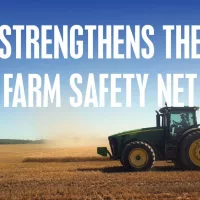
WASHINGTON – U.S. Senator Deb Fischer (R-Neb.), a member of the Senate Agriculture Committee, joined her Senate colleagues in reintroducing the Federal Agriculture Risk Management Enhancement and Resilience (FARMER) Act, to strengthen crop insurance and make higher levels of coverage more affordable for producers. U.S. Senator John Hoeven (R-N.D.) sponsored the legislation.
“For decades, Nebraska’s ag producers have helped feed our nation and the world. As Congress works to pass a Farm Bill, protecting and improving crop insurance for our farmers is one of my top priorities. I am proud to support this legislation to improve the farm safety net, and I look forward to working with Senator Hoeven and our colleagues to get this bill signed into law,” said Fischer.
“Crop insurance remains the number one risk management tool for our farmers, but it doesn’t provide the kind of affordable coverage options that all producers need. The result has been the repeated need for ad-hoc disaster assistance. Ultimately, producers buying higher levels of coverage will lessen the need for ad-hoc disaster assistance in the future. That means less emergency spending by the federal government, greater certainty for farmers and a more resilient ag economy. Those are wins across the board,” said Hoeven.
In addition to Fischer and Hoeven, the legislation is cosponsored by Senate Agriculture Committee Chairman John Boozman (R-Ark.), and U.S. Senators Mitch McConnell (R-Ky), Cindy Hyde-Smith (R-Miss.), Roger Marshall (R-Kan.), Jim Justice (R-W. Va.), Chuck Grassley (R-Iowa), Jerry Moran (R-Kan.), and Joni Ernst (R-Iowa).
BACKGROUND:
Specifically, the FARMER ACT would:
- Increase premium support for higher levels of crop insurance coverage, which will enhance affordability and reduce the need for future ad-hoc disaster assistance.
- Improve the Supplemental Coverage Option (SCO) by increasing premium support and expanding the coverage level, providing producers with an additional level of protection.
- Direct the Risk Management Agency (RMA) to conduct a study to improve the effectiveness of SCO in large counties.
- Not require producers to choose between purchasing enhanced crop insurance coverage or participating in Agriculture Risk Coverage (ARC) and Price Loss Coverage (PLC) programs, giving them flexibility to make decisions that work best for their operations.






